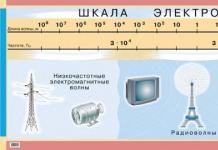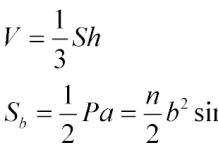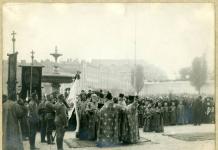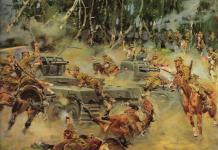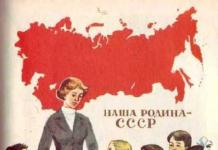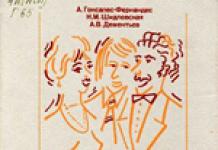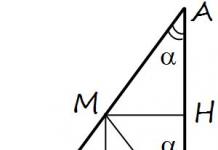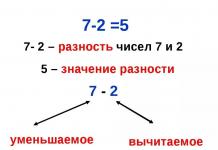In the poem, Lermontov develops the idea of courage and protest, which was laid down earlier in other works. But in this poem, the author almost excludes the love motive, which previously played an essential role. This motive was reflected in Mtsyri's brief meeting with a Georgian woman at a mountain stream. The hero, conquering the involuntary impulse of a young heart, renounces personal happiness in the name of freedom. The poem combines the patriotic idea with the theme of freedom. Lermontov does not share these concepts. In one passion, he merges love for his homeland and a thirst for will.
The monastery becomes a prison for Mtsyri, the cells seem stifling to him, the walls are gloomy and deaf, the guards-monks are cowardly and pitiful, and he himself feels like a slave and a prisoner. His desire to learn a lot about the world, for which he was born, is due to a passionate impulse for freedom. Only outside the monastery Mtsyri lived, only outside the monastery he was free. Only these days he calls bliss.
Mtsyri's courage and resilience are shown in his battle with the leopard. He was not afraid of death, because he knew that returning to the monastery was a continuation of his previous sufferings. The tragic ending does not weaken his spirit, the power of his freedom-loving nature. The old monk's admonitions do not make him repent. Even now he would have traded heavenly pleasure for a few minutes of freedom, for a few minutes of life among his loved ones.
Defeated, he is spiritually not broken and remains a positive image of our literature, and his courage and heroism, fortitude and integrity were a reproach to the fragmented hearts of fearful and inactive contemporaries.
Lermontov's poem continues the tradition of progressive romanticism. Mtsyri, full of fiery passions, gloomy and lonely, revealing his soul in a confession story, is perceived as the hero of romantic poems. However, Lermontov, who created "Mtsyri" in the years when the realistic novel "Hero of Our Time" was also being created, brings such features to this work that are not present in his earlier poems. If the past of the heroes of "Confession" and "Boyar Orsha" remains completely unknown and we do not know the social conditions that shaped their characters, then the lines about Mtsyri's unhappy childhood and adolescence help to better understand the feelings and thoughts of the hero. The very form of confession, characteristic of romantic poems, is associated with the desire to reveal deeper - to tell the soul. This psychologism of the work, the detailing of the hero's experiences are natural for the poet, who at the same time created a socio-psychological novel.
The combination of many metaphors of a romantic nature in the confession itself (images of fire, fieryness) with a realistically accurate and poetically stingy speech of the introduction ("Once a Russian general ...") is expressive. The poem, romantic in form, testified to the growth of realistic tendencies in Lermontov's work.
Romantic symbolism in the work "Mtsyri"
The theme of the path is especially developed in the work "Mtsyri", written in 1839. The central event in the poem is the escape of the main character, Mtsyri, from the monastery, or rather the story about it. The motive of the path in this work is associated with freedom, the loss of which is equal to the loss life path, the meaning of life.
I ran for a long time - where, where?
Do not know! not a single star
Didn't light up the hard way.
It was fun for me to breathe ...
Another romantic symbol appears in this work - fire. Fire symbolizes purification, renewal of life, strength, energy, passion. The flame is a typical symbolic representation of the heart. Fire is the basis of Mtsyri's image, it is his love, thoughts of freedom (the hero who grew up within the walls of the monastery remains full of the fire of struggle), even illness and quick death. Mtsyri sees fire, life only outside the monastery. The poet's "favorite ideal" is close to the personality of Lermontov himself. He, like Mtsyri, is characterized by a "fiery passion" for freedom, a desire for action, "struggle". Emotional, agitated speech of Mtsyri with extraordinary power expresses his ardent, freedom-loving nature, elevates his moods and experiences.
Then, empty without wasting tears,
In my heart I swore an oath:
Though for a moment someday
My burning chest
Press another longingly to the chest,
Though unfamiliar, but dear.
Alas! now those dreams
Died in full beauty
And how I lived, in a foreign land
I will die a slave and an orphan.
In the poetics of "Mtsyri" the author also uses other images-symbols characteristic of a romantic work: storms, single combats, memories, pictures of nature. Representatives of flora and fauna who come into contact with the hero are natural in such a work.
You wanna know what i saw
In the wild? - Lush fields,
Hills covered with a crown
The trees that have grown all around
Rustling with a fresh crowd
Like brothers in a circular dance.
I saw piles of dark rocks
When the stream was separating them.
And I guessed their thoughts:
It was given to me from above!
Lermontov tried to emphasize the great symbolic significance of the fate of Mtsyri: the hero of the poem has no name, his fate is the generalized fate of a romantic alien and a prisoner, and not a presentation of a story based on the biography of a specific person who is a prototype. One manuscript of the poem has survived - an authorized copy, part of which is an autograph. Title and date: ““ Beri. Poem. 1839. The footnote says: “Beri - in Georgian - monk.” Lermontov refused this name and, having included the poem in the collection “Poems”, entitled it “Mtsyri” (in Note explained that in Georgian it means “non-serving monk, novice.”) In Georgian, it means not only “novice”, but also “alien”, “foreigner”, a lonely person who does not have relatives and friends.
A capacious symbol is nature in the poem "Mtsyri": it is a world in which romantic hero sees a semblance of an ideal world of "troubles and battles" created in his soul. Nature is the goal and meaning of his escape from the monastery, the "homeland" where he dreams of returning. But nature becomes a formidable rival for Mtsyri: the leopard, with whom the hero entered the battle, is not just a strong and beautiful beast, it is a symbol of the brute force of nature, its hostility to man. The fight with the leopard is symbolic: it became a duel between the matter of nature, embodied in the leopard, and the unyielding, proud human spirit embodied in Mtsyri.
I was waiting. And now in the shadow of the night
He sensed the enemy, and howl
Lingering, plaintive as a moan
Suddenly sounded ... and he began
Digging sand with a paw
He reared up, then lay down,
And the first frantic leap
I was threatened with a terrible death ...
But I warned him.
My blow was sure and swift.
My reliable bitch is like an ax,
His broad forehead cut ...
He groaned like a man
And overturned. But again,
Though blood was pouring from the wound
Thick, broad wave,
The fight is in full swing, mortal combat!
But the main symbol of the poem "Mtsyri" is a symbol of bondage - a monastery (in the lyrics it corresponds to a prison).
Your prison is stamped on me
Left ... This is the flower
Dungeon: grew up alone
And he is pale between damp slabs,
And the long leaves of the young
I did not dissolve, everything is waiting for the rays
Life-giving. And many days
Gone and a good hand
Sadness touched a flower,
And he was transferred to the garden,
In the neighborhood of roses. From all sides
I breathed the sweetness of being ...
But what then? As soon as the dawn rose
The scorching ray burned her
A raised flower in prison ...
It is important to note that the action of many of the poet's works takes place in monasteries or near them. But the romantic hero of Lermontov leaves the world for his own sake, his desires, submitting to his own passions, while the novice sacrifices everything for the sake of God. That is why the heroes of Mikhail Yuryevich's poems have a negative attitude towards monasteries as the antipode of freedom, will, and happiness.
What do we learn about Mtsyri's life in the monastery? The author does not describe the life of the monastery, but conveys only Mtsyri's brief remarks about it. For the hero, a monastery is a symbol of bondage, a prison, with “gloomy walls” and “stuffy cells”, where a person is infinitely lonely. Staying in a monastery means forever giving up freedom and homeland. ... I lived a little, and lived in captivity ... ... She called my dreams From the stuffy cells and prayers ... ... I grew up in the gloomy walls Soul - a child, fate - a monk ...
Picture 19 from the presentation "Mtsyri" to literature lessons on the topic "Lermontov's Poems"Dimensions: 960 x 720 pixels, format: jpg. To download a picture for free literature lesson, right-click on the image and click "Save Image As ...". To show pictures in the lesson, you can also download the entire presentation "Mtsyri.ppt" with all pictures in a zip-archive for free. The archive size is 347 KB.
Download presentationLermontov's poems
"Bela Hero of Our Time" - After all, you were a passionate hunter to shoot ... And Bela? ..? Scrapbook romantic novella. Grushnitsky is a caricature of Pechorin. Pechorin and Onegin. 14 (26) December 1825 - the last attempt in the history of Russia to attempt a guards palace coup. All that will be has not yet come. "One of our century". April 1840 - published “Composition of M.Yu. Lermontov's "A Hero of Our Time".
"Prophet Lermontov" - Transformation of a man into a prophet. A world of suffering and tears. Early love lyrics... Two Prophets from Russian Literature. A clear, harmonious world. The goal is to “ignite the fighter for battle”. B. M. Eikhenbaum. The goal is "to burn the hearts of people with a verb." He grew up under the strict supervision of his grandmother. "The Prophet" by Lermontov. The triumph of present and future life.
"Poet Lermontov" - NS Martynov 1815-1875. The poet writes to a friend from the Caucasus: “Dear friend Svyatoslav! F.O. Budkin. Portrait of M.Yu. Lermontov in an army frock coat with a saber. 1840 Drawing. A.I. Herzen. Lermontov was killed by Martynov in a duel in the Caucasus. M.Yu. Lermontov. Bryullov, who painted not portraits, but glances, who knew how to insert fire into his eyes.
"Lermontov about love" - Love for Ivanova went into difficult oblivion, as the hobby for Sushkova was gone. Natalia Ivanova. Lermontov is a rushing man looking for affection and love. Rostopchina was the sister of comrade Lermontov of boarding years S.P. Sushkov. All the warmth of love was concentrated in him alone. Instead of a conclusion ... Poems dedicated to N.F. Ivanova: "N.F.I ... howl"; "Romance to And ..."; "K ***" ("The Almighty ..."); “To NI …….”; "I will not humiliate myself ...".
"Lermontov Roman" - How does Lermontov see his generation? Determine the correct sequence of the arrangement of the chapters of the novel. "Taman". Preface to "Pechorin's Journal". Historical and literary aspect of the problem. Contempt or hatred for humanity! " (from a letter to his wife). "Maxim Maksimych". M.Yu. Lermontov. The fate of the generation of the 30s in the work of M.Yu. Lermontov.
"Lermontov's Destiny" - Write an essay "My impression of Lermontov" using the keywords and conclusions recorded in the lesson. M.Yu. Lermontov: personality, fate, era. Motives of Lermontov's lyrics. Lyrical hero- "Lermontov man". V. Brusov. Sonnet "To the portrait of Lermontov". Portraits of M.Yu. Lermontov. And we, the poet, did not solve you, We did not understand the infant sorrow In your as if forged poetry!
There are 32 presentations in total
Composition
It's simple: it's history short life Mtsyri, the story of his failed attempt to escape from the monastery. Mtsyri's life is poor in external events; we only learn that the hero never experienced happiness, was taken prisoner from childhood, suffered a serious illness and found himself alone in a foreign land and among strangers to him, monks. The young man makes an attempt to find out why a person lives, what he was created for. Escape from the monastery and three-day wanderings introduce Mtsyri to life, convince him of the senselessness of monastic existence, bring a feeling of joy in life, but do not lead to the desired goal - to return the homeland and freedom. Not finding a way to his native country, Mtsyri again finds himself in the monastery. His death is inevitable; in his deathbed confession, he tells the monk about everything that he had seen and experienced during “three blissful days”. In the poem, such a sequence in the presentation of the plot is not sustained.
The composition "Mtsyri" is very peculiar: after a short introduction, which depicts a view of an abandoned monastery, a small second chapter-stanza tells the whole life of Mtsyri in a calm epic tone; and all the other stanzas (there are 24 of them) represent the hero's monologue, his confession to the monk. Thus, the author told about the life of the hero in two stanzas, and a whole poem was written about the three days spent by Mtsyri at large. And this is understandable, since three days of liberty gave the hero as many impressions as he did not receive in many years of monastic life.
In the center of the poem is the image of a young man placed in unusual conditions by life. Monastic existence is poor in external events; it does not bring joy to a person, but it also cannot destroy his aspirations and impulses. The author focuses on these aspirations, on inner world hero, and the external circumstances of his life only help to reveal the character. Mtsyri's monologue allows the reader to penetrate the innermost thoughts and feelings of the hero, although the young man at first declares that his story is only about what he saw and what he did, and not what he experienced (“Can you tell the soul?” - he turns to the monk) ...
The composition of the monologue makes it possible to gradually reveal the inner world of the hero. First (stanzas 3, 4, 5) Mtsyri talks about his life in the monastery and reveals what was not known to the monks. Outwardly an obedient novice, "a child in soul, a monk by fate," he was possessed by a fiery passion for freedom (stanza 4), a youthful thirst for life with all its joys and sorrows (stanza 5). Behind these dreams and aspirations of Mtsyri, one can guess the circumstances and reasons that brought them to life. The image of a gloomy monastery with stuffy cells, inhuman laws and an atmosphere where all natural tendencies are suppressed appears.
Then Mtsyri tells what he saw “in the wild”. The "wonderful world" he discovered contrasts sharply with the gloomy world of the monastery. The young man is so carried away by the memories of the living pictures he has seen (and they lead him to thoughts about his native village) that he seems to forget about himself, says almost nothing about his feelings. In what pictures he recalls and in what words he draws them, his fiery nature, integral in his aspirations, is revealed. Finally, in the following verses (starting from the 8th) Mtsyri talks about external events three days of wandering, about everything that happened to him at large, and about everything that he felt and experienced during these days free life... Now the sequence of events is not broken, we move step by step together with the hero, vividly imagine the world around him and follow his every mental movement. The last two stanzas are Mtsyri's farewell to life and his will. Unable to return to his homeland, Mtsyri is ready to die. But even before his death, he refuses to acknowledge the monastic existence. His last thoughts are about homeland, freedom, life.
Having briefly examined the composition of the poem, it is easy to show its justification and regularity. The peculiarity of the composition is not only in the displacement of the sequence of events, but in the fact that they are all. are shown through the subjective perception of the hero. It is not the author who describes the experiences and feelings of Mtsyri, but the hero himself talks about them. The lyrical element predominates in the poem, and the epic narration included in the hero's monologue is focused on individual, most intense moments of the action (meeting with a Georgian woman, fighting a leopard, etc.) and aims to deepen the impression of certain properties and characteristics of the hero ... A lot in the construction of the poem and the character of its protagonist is determined by the fact that "Mtsyri" - romantic piece.
What was the monastery life of Mtsyri. Lermontov does not give a detailed description of it. Therefore, it is advisable to first explain that monastic life meant, first of all, a departure from people, from the world, a complete rejection of one's own personality, "service to God", expressed in monotonous alternating fasts and prayers. The main condition for living in a monastery is obedience. Those who took a monastic vow were forever cut off from human society; the return of a monk to life was prohibited. Lermontov does not describe monastic life, but conveys only Mtsyri's brief remarks about it. For the hero, a monastery is a symbol of bondage, a prison, with “gloomy walls” and “stuffy cells”, where a person is infinitely lonely. Staying to live in a monastery meant for him to forever renounce freedom and homeland, to be doomed to eternal slavery and loneliness (“to be a slave and an orphan”).
The author does not reveal the character of the boy who entered the monastery; he only shows his physical weakness and fearfulness, and then gives a few strokes of his behavior, and the personality of the captive-mountaineer looms clearly. He is hardy ("He languished without complaints - even a faint moan did not come out of children's lips"), proud, distrustful, because he sees his enemies in the surrounding monks, from the very early years familiar unchildish feelings of loneliness and melancholy.
There is also a direct author's assessment of the boy's behavior, which reinforces the impression: Lermontov speaks of his "mighty spirit" inherited from his fathers. Mtsyri's story confirms the validity of these conclusions, allows you to penetrate into the soul of the hero and learn not only about his character, but also about his thoughts and feelings. They all boil down to "fiery passion" - the dream of freedom. The fieryness of this passion, its brightness does not seem exaggerated and implausible. It is natural and justified by the exceptional circumstances of a young man's life. He is deprived of everything that brings joy and happiness to a person: he has no homeland, home, friends, relatives:
* I saw the Fatherland from others,
* home, friends, relatives,
* But I did not find
* Not only sweet souls - graves!
Under such conditions, the natural human striving for happiness takes on the character of a passion that has completely taken possession of a person. You can tell the students that the feelings and desires of Mtsyri are true and convincing, but taken in the highest form of their manifestation, taken to the extreme, exclusivity.
Other compositions on this work
"Yes, I deserve my lot!" (the tragic hero of the poem "Mtsyri".) "The garden of God bloomed around me ..." (based on the poem "Mtsyri") "Mtsyri" as a romantic poem "Mtsyri" - a romantic poem by M. Yu. Lermontov What is the meaning of life for Mtsyri? What Mtsyri sees happiness The spiritual world of Mtsyri (Based on the poem "Mtsyri" by M. Yu. Lermontov) The unity of man and nature in the poem "Mtsyri" Genre and composition of Lermontov's poem "Mtsyri" The meaning of the epigraph to the poem "Mtsyri" Ideological and thematic connection of the poem "Mtsyri" with the lyrics of M. Yu. Lermontov What values are affirmed in M. Yu. Lermontov's poem "Mtsyri"? What episodes of Mtsyri's 3-day wanderings do I consider especially important and why? (based on the poem of the same name by Lermontov) What episodes of Mtsyri's three-day wanderings do I consider especially important and why? (based on the poem "Mtsyri" by M. Yu. Lermontov) What are the similarities between the heroes of the works of M. Yu. Lermontov: Pechorin and Mtsyri. M. Yu. Lermontov "Mtsyri" My reflections on the poem "Mtsyri" Mtsyri is the main character Mtsyri and the exiled poet Mtsyri as a romantic hero Mtsyri - Lermontov's "favorite ideal" Mtsyri is the “favorite ideal” of M. Yu. Lermontov. Mtsyri is the protagonist of the romantic poem by N. Yu. Lermontov The rebellious hero of M.Yu. Lermontov The image of Mtsyri (based on the poem of the same name by M.Yu. Lermontov) The image of Mtsyri in the poem "Mtsyri" by M. Yu. Lermontov. Features of the genre of the poem in the work of M. Yu. Lermontov Features of the genre of the poem in the work of M. Yu. Lermontov (on the example of the poem "Mtsyri") Features of the genre of the poem in the work of M.Yu. Lermontov on the example of one work ("Mtsyri"). Features of the language of the poem "Mtsyri" Mtsyri's escape from the monastery Why Mtsyri fled from the monastery Why did Mtsyri run away from the monastery? (based on Lermontov's poem "Mtsyri") Why was the fate of the main character of M. Yu. Lermontov's poem "Mtsyri" so tragic? Why was the fate of Mtsyri so tragic? (based on the poem "Mtsyri" by M. Yu. Lermontov) Poem "Mtsyri" The poem "Mtsyri" is one of the most amazing poetic creations of M. Yu. Lermontov Poem by M. Yu. Lermontov "Mtsyri" as a romantic work Poem by M.Yu. Lermontov "Mtsyri" as a romantic work Nature as understood by Mtsyri The romantic hero Mtsyri (Based on the poem "Mtsyri" by M. Yu. Lermontov) Characteristics of Mtsyri (based on the poem "Mtsyri" by M.Yu. Lermontov) Man and nature in the poem "Mtsyri" by M. Yu. Lermontov The theme of loneliness in Lermontov's poem "Mtsyri" Analysis of Lermontov's poem "Mtsyri" What moral values are affirmed in the poem by M.Yu. Lermontov "Mtsyri" Romanticism in Lermontov's poem "Mtsyri" and "Song about the merchant Kalashnikov" Mtsyri - the image of a strong man (based on the poem "Mtsyri" by M. Yu. Lermontov) The plot, problems, images of one of the poems by M.Yu. Lermontov ("Mtsyri") The connection between man and nature in M. Yu. Lermontov's poem "Mtsyri" Theme and idea of the poem Mtsyri Poem Demon. A fairy tale for children. "Mtsyri". - artistic analysis Mtsyri is my favorite literary hero The artistic originality of the poem "Mtsyri" Why the escape of Lermontov's Mtsyri ended at the walls of the monastery The image and character of Mtsyri in the poem "Mtsyri" What is the happiness and tragedy of Mtsyri Romantic hero mtsyri The image of a proud and rebellious young man in M. Yu. Lermontov's poem "Mtsyri" (1) Poem by M. Yu. Lermontov "Mtsyri" and its main character The main character in the poem Mtsyri Poems by M. Yu. Lermontov "Demon", "Mtsyri", "Song about the merchant Kalashnikov" The originality of one of the romantic poems of M.Yu. Lermontov (on the example of "Mtsyri") "Soul - a child, Fate - a monk" (based on the poem "Mtsyri" by M. Yu. Lermontov) (1) "Soul - a child, Fate - a monk" (based on the poem "Mtsyri" by M. Yu. Lermontov) (2) Mtsyri's dream come true The pathos of the poem in the works "Mtsyri" and "The Fugitive" The spiritual world of Mtsyri. Composition based on the poem "Mtsyri" Reflection of the motives of Lermontov's lyrics in the poem "Mtsyri" Literary analysis of the poem "Mtsyri" by Lermontov The independence of the hero's personal consciousness in the poem "Mtsyri" "Conflict between soul and destiny" (based on the poem "Mtsyri" by M. Yu. Lermontov) The chanting of will and freedom in the poem by M.Yu. Lermontov "Mtsyri"For the hero, the monastery is a symbol of bondage, a prison with gloomy walls and "stuffy cells." Staying to live in a monastery meant for him to forever abandon his homeland and freedom, to be doomed to eternal slavery and loneliness. He is hardy, proud, distrustful, because he sees his enemies in the surrounding monks. From an early age he is familiar with unchildish feelings of loneliness and melancholy. A direct author's assessment of the boy's behavior is contained in Lermontov's words about the mighty spirit of the young prisoner, inherited from his fathers. EXAMPLE!!!


Which of the interpretations of this word most accurately defines the character of the hero? Mtsyri is a person who lives not according to the far-fetched laws of the state that suppress human freedom, but according to the natural laws of nature that allow the individual to reveal himself, to realize his aspirations. But the hero is forced to live in captivity, within the walls of a monastery alien to him.

What was the purpose of Mtsyri's escape? What does it mean for Mtsyri to be free? Mtsyri's idea of freedom is associated with the dream of returning to his homeland. To be free means for him to escape from the monastery captivity and return to his native village. The image of an unknown but desired "wonderful world of troubles and battles" was constantly living in his soul.


What episodes of Mtsyri's three-day wanderings do you consider especially important? Why? The personality of Mtsyri, his character is revealed in which pictures attract the hero, and how he speaks about them. He is struck by the richness and brightness of nature, in sharp contrast to the monotony of the monastic existence. And in the close attention with which the hero looks at the world, one can feel his love for life, striving for everything beautiful in it, sympathy for all living things.

What did Mtsyri know when he was free? Free from new strength Mtsyri's love for his homeland was revealed, which merged for the young man with a desire for freedom. In freedom, he learned the "bliss of freedom" and strengthened in his thirst for earthly happiness. After living for three days outside the walls of the monastery, Mtsyri realized that he was brave and fearless. Mtsyri's “fiery passion” - love for his homeland - makes him purposeful and firm.

What does it mean to live for a hero? To be in constant search, anxiety, to fight and win, and most importantly, to experience the bliss of “the freedom of the saint” - these experiences very clearly reveal the fiery character of Mtsyri. Only real life tests a person and shows what he is capable of.

Did Mtsyri find the answer to the question: "is the earth beautiful?" Why does man live on earth? Mtsyri saw nature in its diversity, felt her life, experienced the joy of communicating with her. Yes, the world is beautiful! - this is the meaning of Mtsyri's story about what he saw. His monologue is a hymn to this world. And the fact that the world is beautiful, full of colors and sounds, full of joy, gives the hero an answer to the second question: why was man created, why does he live? Man is born for the will, not for the prison.

Why did Mtsyri die? Why, despite the death of the hero, do we not perceive the poem as a gloomy work, filled with despair and hopelessness? The origins of the Mtsyri tragedy are in the conditions that surrounded the hero from childhood. The circumstances in which he found himself left their mark on him, making him a "dungeon flower", and led to the death of the hero. Such a defeat at the same time is a victory: life doomed Mtsyri to eternal slavery, humility, loneliness, and he managed to learn freedom, experience the happiness of struggle and the joy of merging with the world. Therefore, his death, with all the tragedy, makes us proud of Mtsyri and hatred of the conditions that deprive him of happiness.

Homework In writing: a detailed answer to the following statements: To "3": "It is not clear why Mtsyri fled during a thunderstorm without any preparation. He had to prepare for the escape, stock up on salt, bread, and dress well. And then he took it and jumped out recklessly "On" 4 ":" It is not clear why Mtsyri fought with the leopard. After all, he could freely leave until the leopard smelled him. Because of this, I became exhausted and died, and if I had left, maybe I would have made it to my homeland. " free people that he has been striving for all his life? "



